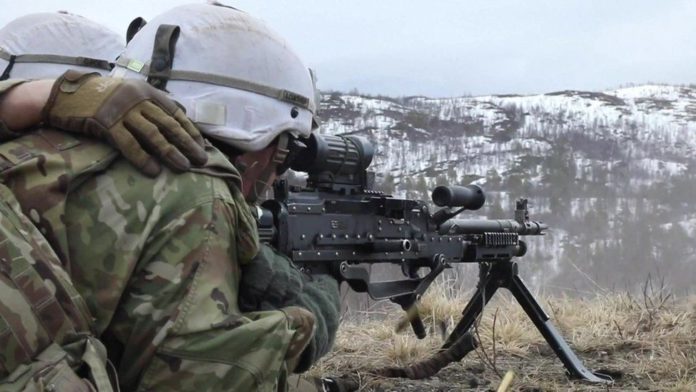
One of the biggest-ever Nato exercises in the Baltics is now under way.
Named “Hedgehog”, the drills involve 10 countries, including Finland and Sweden, which are expected to formally apply to join the alliance within days.
The exercises in Estonia, which will last until 3 June, were arranged before Russia’s invasion of Ukraine.
Vladimir Putin has said Russia has no issue with Finland or Sweden, but a military expansion near its border would demand a reaction.
Sweden on Monday confirmed its intention to apply for Nato membership, joining Finland, which declared its position last week.
Nato has said the aim of the exercises is to “enhance the readiness and interoperability” of its forces.
Some 15,000 troops are involved in the exercise in Estonia, making it one of the largest military drills held in the country since 1991.
The exercise is taking place 64km (40 miles) from Russia’s nearest military base. It is intended to simulate an attack from Russia on Estonia.
Russia sees Nato as a security threat and has warned of “consequences” for the prospective new members.
Sweden stayed neutral in World War Two and for more than two centuries has avoided joining military alliances.
Finland, meanwhile, shares a 1,300-km (810-mile) border with Russia. Until now, it has stayed out of Nato to avoid antagonising its eastern neighbour.
The exercises were planned before Russia’s invasion of Ukraine on 24 February. But amid the growing security threat from Russia, they are being closely watched.
Finland and Sweden confirmed they will apply for Nato membership, on Thursday and Sunday respectively. They are expected to hand in their formal bids to join the alliance on Wednesday.
Nato Secretary General Jens Stoltenberg suggested that there could be a fast-track process to the two countries’ application, with interim security arrangements put in place to deal with any possible Russian retaliation.
Despite its rather cosy codename, Nato Exercise Hedgehog (“Siil” in Estonian) is taking place at a time of heightened tensions in the Baltics, says BBC security correspondent Frank Gardner.
Russia’s invasion of Ukraine has convinced governments in the region that they need to seriously beef up their defences if they are to deter President Putin from further military aggression, our correspondent adds.
Estonian Foreign Minister Eva-Maria Liimets said: “We see that once our close neighbours and friends would join Nato, then of course, the overall security environment in our region would increase and especially around the Baltic Sea.”
Kremlin spokesman Dmitry Peskov has said Russia was watching the expansion closely, adding that he was convinced it would not strengthen the security of Europe.
“This is a serious issue, an issue that raises our concern, and we will follow very carefully,” he said.
Across Europe, other Nato exercises are being held in Poland, North Macedonia and Lithuania.






